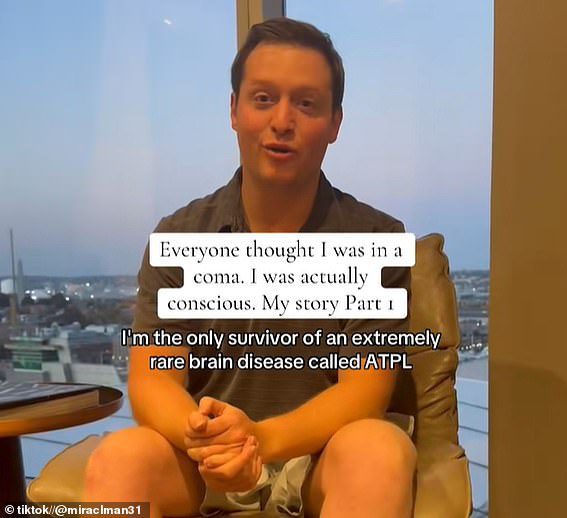
The Remarkable Recovery of Jake Haendel: A Journey from Locked-In Syndrome to Hope
For nearly a year, Jake Haendel experienced a life-altering condition that left him unable to move or speak, yet fully aware of his surroundings. At just 28 years old, this former chef found himself grappling with a rare neurological disorder that severely affected his ability to communicate and control his body.
Medical professionals remain uncertain about the precise cause of his condition, suggesting that exposure to some form of toxin could be responsible. Initially, doctors provided him with a grim prognosis, predicting he had only six months to live. However, Jake has since declared himself the only person to have survived this formidable condition.
What began with a subtle change in voice and balance issues quickly escalated over a few months, rendering him completely immobile and unable to express himself, despite retaining full cognitive function. Jake’s ordeal was compounded by the development of locked-in syndrome, a severe state of consciousness where he was unable to move or speak but was still fully aware of everything around him.
Despite the severity of his condition, which was declared terminal by his doctors, Jake was sent home to be with family. Unfortunately, they were mostly unaware that he was still conscious. During this time, he overheard discussions about his state—being called "brain dead"—and witnessed a shocking altercation between his father and ex-wife, highlighting how misunderstood his situation was.
Jake’s struggle began in May 2017, just after he got married and was working as the executive chef of a restaurant. He started feeling strangely unwell, his voice became higher-pitched, and he noticed issues with his balance. Prompted by his then-wife, he sought medical help, and the situation quickly escalated; within a day, he was surrounded by doctors who delivered the devastating news about his rare brain disease, acute toxic leukoencephalopathy (ATL).
This disease primarily affects the brain’s white matter, disrupting communication and movement. The acute toxic progressive variant that Jake suffered from indicated rapidly worsening symptoms leading to locked-in syndrome. Unable to move or speak, he often felt trapped in his own body, hearing conversations about his condition that painted a bleak picture of impending death.
Locked-in syndrome is not only physically isolating; it is also emotionally distressing. Jake has recounted instances where the medical team considered him unresponsive, unaware that he could understand their words. One particularly jarring moment came when he heard a nurse dismiss his condition, stating he couldn’t hear anything because he was "brain dead." This realization led to a profound fear of remaining in that state indefinitely.
As months passed, the prognosis from doctors played out as expected. ATL caused Jake’s body to deteriorate to the point where he could no longer walk, eat, or communicate. He was warned that he would require extensive medical support, including feeding and breathing tubes, as his condition progressed.
Despite this grim reality, a turning point in Jake’s journey occurred when a doctor at Mass General Hospital noticed small movements he was making. Initially dismissed as involuntary, this observation sparked a glimmer of hope. The doctor encouraged him to try to move, resulting in Jake gathering all his strength to signal his awareness, a moment he described as a significant breakthrough.
Through intensive rehabilitation, including physical therapy, occupational therapy, and the support of a speech therapist, Jake learned to communicate through blinking and later using a letterboard, where he could spell out his thoughts. His rehabilitation journey continued over the years, culminating in a renewed ability to move his neck, hands, and eventually, his arms.
By the end of 2020, after years of relentless effort, he rejoined his family at home, although he still required 24/7 care. Today, at age 36, Jake continues to make strides in his recovery, learning to walk with the aid of a cane. His incredible journey highlights both the resilience of the human spirit and the importance of compassion in healthcare, demonstrating that hope can prevail even in the direst circumstances.
Jake Haendel’s transformation and ongoing healing are a testament to perseverance. His story not only encourages those facing similar struggles but also raises awareness about the complexities of brain diseases like ATL.









